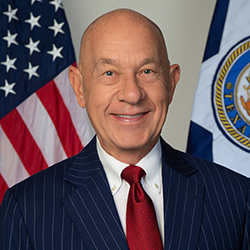From the Associated Press:
The measles outbreak in West Texas didn’t happen just by chance.
The easily preventable disease, declared eliminated in the U.S. in 2000, ripped through communities sprawling across more than 20 Texas counties in part because health departments were starved of the funding needed to run vaccine programs, officials say.
“We haven’t had a strong immunization program that can really do a lot of boots-on-the-ground work for years,” said Katherine Wells, the health director in Lubbock, a 90-minute drive from the outbreak’s epicenter.
Immunization programs nationwide have been left brittle by years of stagnant funding by federal, state and local governments. In Texas and elsewhere, this helped set the stage for the measles outbreak and fueled its spread. Now cuts to federal funding threaten efforts to prevent more cases and outbreaks.
Health departments got an influx of cash to deal with COVID-19, but it wasn’t enough to make up for years of neglect. On top of that, trust in vaccines has eroded. Health officials warn the situation is primed to get worse.
Recent cuts by the Trump administration have pulled billions of dollars in COVID-19 related funding — $2 billion of it slated for immunization programs for various diseases. Overseeing the cuts is Health Secretary Robert F. Kennedy Jr., who rose to prominence leading an anti-vaccine movement. While Kennedy has said he wants his agency to prevent future outbreaks, he’s also declined to deliver a consistent and forceful message that would help do so — encouraging people to vaccinate their children against measles while reminding them it is safe.
At the same time, lawmakers in Texas and about two-thirds of states have introduced legislation this year that would make it easier to opt out of vaccines or otherwise put up barriers to ensuring more people get shots, according to an analysis by The Associated Press. That further undercuts efforts to keep infectious diseases at bay, health officials said.
[…]
Lubbock receives a $254,000 immunization grant from the state annually that can be used for staff, outreach, advertising, education and other elements of a vaccine program. That hasn’t increased in at least 15 years as the population grew.
It used to be enough for three nurses, an administrative assistant, advertising and even goodies to give out at health fairs, Wells said. “Now it covers a nurse, a quarter of a nurse, a little bit of an admin assistant, and basically nothing else.”
Texas has among the lowest per capita state funding for public health in the nation, just $17 per person in 2023, according to the State Health Access Data Assistance Center.
Vaccines are among the most successful tools in public health’s arsenal, preventing debilitating illnesses and lowering the need for expensive medical care. Childhood vaccines prevent 4 million deaths worldwide each year, according to the U.S. Centers for Disease Control and Prevention, which says the measles vaccine will save some 19 million lives by 2030.
U.S. immunization programs are funded by a variable mix of federal, state and local money. Federal money is sent to every state, which then decides how much to send to local health departments.
The stagnant immunization grant funding in Texas has made it harder for local health departments to keep their programs going. Lubbock’s health department, for example, doesn’t have the money to pay for targeted Facebook ads to encourage vaccinations or do robust community outreach to build trust.
In Andrews County, which borders Gaines County, the biggest cost of its immunization program is personnel. But while everything has gotten more expensive, the grant hasn’t changed, Health Director Gordon Mattimoe said. That shifts the burden to county governments. Some kick in more money, some don’t. His did.
The problem: keeping people safe from outbreaks requires high vaccination rates across a broad region, and germs don’t stop at county borders.
Andrews County, population 18,000, offers a walk-in vaccine clinic Monday through Friday, but other West Texas communities don’t. More than half the people who come to the clinic travel from other counties, Mattimoe said, including much larger places and Gaines County.
Some had to drive an hour or more. They did so because they had trouble getting shots in their home county due to long waits, lack of providers and other issues, Mattimoe said.
“They’re unable to obtain it in the place that they live. … People are overflowing, over to here,” Mattimoe said. “There’s an access issue.”
That makes it more likely people won’t get their shots.
In Gaines County just 82% of kindergartners were vaccinated against measles, mumps and rubella. Even in Andrews County, where, at 97%, the vaccination rate is above the 95% threshold for preventing outbreaks, it has slipped two percentage points since 2020.
Andrews County is Gaines County’s neighbor to the south. They were doing pretty well before all this, despite being as small and in the middle of nowhere as Gaines is. So much for that.
From the KFF Health News.
More than a dozen vaccination clinics were canceled in Pima County, Arizona.
So was a media blitz to bring low-income children in Washoe County, Nevada, up to date on their shots.
Planned clinics were also scuttled in Texas, Minnesota, and Washington, among other places.
Immunization efforts across the country were upended after the federal Centers for Disease Control and Prevention abruptly canceled $11.4 billion in covid-related funds for state and local health departments in late March.
A federal judge temporarily blocked the cuts last week, but many of the organizations that receive the funds said they must proceed as though they’re gone, raising concerns amid a resurgence of measles, a rise in vaccine hesitancy, and growing distrust of public health agencies.
“I’m particularly concerned about the accessibility of vaccines for vulnerable populations,” former U.S. surgeon general Jerome Adams told KFF Health News. Adams served in President Donald Trump’s first administration. “Without high vaccination rates, we are setting those populations and communities up for preventable harm.”
[…]
In Pima County, Arizona, officials learned that one of its vaccination programs would have to end early because the federal government took away its remaining $1 million in grant money. The county had to cancel about 20 vaccine events offering covid and flu shots that it had already scheduled, said Theresa Cullen, director of the county health department. And it isn’t able to plan any more, she said.
The county is home to Tucson, the second-largest city in Arizona. But it also has sprawling rural areas, including part of the Tohono O’odham Nation, that are far from many health clinics and pharmacies, she said.
The county used the federal grant to offer free vaccines in mostly rural areas, usually on the weekends or after usual work hours on weekdays, Cullen said. The programs are held at community organizations, during fairs and other events, or inside buses turned into mobile health clinics.
Canceling vaccine-related grants has an impact beyond immunization rates, Cullen said. Vaccination events are also a chance to offer health education, connect people with other resources they may need, and build trust between communities and public health systems, she said.
County leaders knew the funding would run out at the end of June, but Cullen said the health department had been in talks with local communities to find a way to continue the events. Now “we’ve said, ‘Sorry, we had a commitment to you and we’re not able to honor it,’” she said.
Cullen said the health department won’t restart the events even though a judge temporarily blocked the funding cuts.
“The vaccine equity grant is a grant that goes from the CDC to the state to us,” she said. “The state is who gave us a stop work order.”
The full effect of the CDC cuts is not yet clear in many places. California Department of Public Health officials estimated that grant terminations would result in at least $840 million in federal funding losses for its state, including $330 million used for virus monitoring, testing, childhood vaccines, and addressing health disparities.
“We are working to evaluate the impact of these actions,” said California Department of Public Health Director Erica Pan.
Jerome Adams, who seems to be a pretty normal dude despite having been Surgeon General during Trump I, has a quote at the end of that story about how none of this is making America healthy, saying you “can’t die from chronic diseases when you’re 50 if you’ve already died from measles or polio or whooping cough when you’re 5”. I mean, he’s right.
And here’s your Tuesday update.
Texas health officials reported Tuesday that the state’s measles outbreak grew to 561 cases and spread to one new county.
The latest update from the Texas Department of State Health Services includes 20 new cases since the agency’s last update on Friday. Among the new cases is the first in Reeves County, in West Texas.
Fifty-eight people have been hospitalized for treatment since the outbreak began in late January.
[…]
The Texas outbreak has also spread several neighboring states. New Mexico reported 63 cases on Tuesday, while Oklahoma reported 12. New Mexico has reported one suspected measles death, an unvaccinated adult who tested positive for the virus after dying.
Nine of the 20 new cases reported on Tuesday are in Gaines County, the epicenter of the outbreak. The small county along the New Mexico border has now seen a total of 364 cases.
El Paso County reported four new cases, raising its total to seven. The state’s westernmost county reported its first cases on Friday.
Three new cases were reported in Lubbock County, which has now seen 41 during the outbreak.
Reeves County reported its first case associated with the outbreak. Andrews, Cochran, and Midland counties also reported one new case.
The DSHS said there is ongoing measles transmission in 10 counties across the state: Cochran, Dallam, Dawson, Gaines, Garza, Lynn, Lamar, Lubbock, Terry and Yoakum.
Of the 561 cases in Texas, 175 have been in children younger than 5 years old and 206 have been in children and teens between 5 and 17, according to the DSHS.
Only 11 cases have been in people who received at least one dose of MMR vaccine prior to an infection.
Texas has reported a total of seven measles cases in 2025 that are not connected to the South Plains outbreak, including four in Harris County and one in Fort Bend County. Most of those cases are associated with international travel, according to the DSHS.
Yesterday was a bit of a dumpster fire for me, so I didn’t go out looking for more stories; the first two I found before Tuesday. Two things to note: One is the outbreak now reaching into more populated areas – El Paso, Lubbock, Midland – which may provide a lot more kindling for the fire. You can hope the vax rates are better in those places than they are in the likes of Gaines County, but those three have a lot more people in them, and even a small percentage of a big number is still a big number. And two, the story says that the DSHS estimates about four percent of the affected people – about 25 in total – are actively infectious. That’s not a lot, but on average a person with the measles is capable of passing it on to 18 other people, and that is a lot. Remember, the best guess is that this will last for a year or so. We’ve got a long way to go.



















